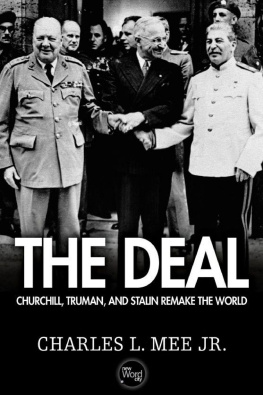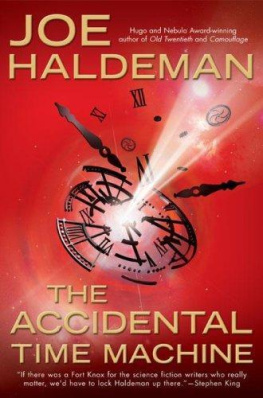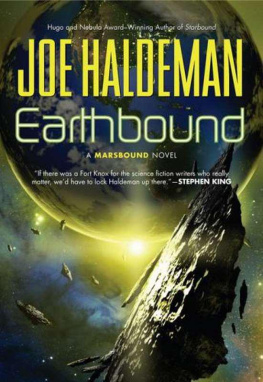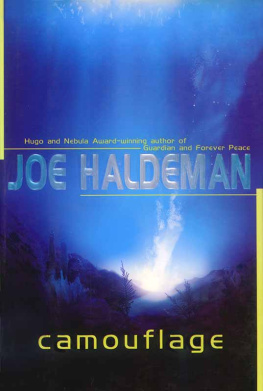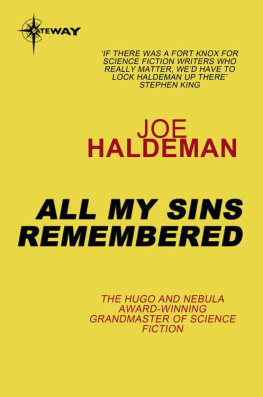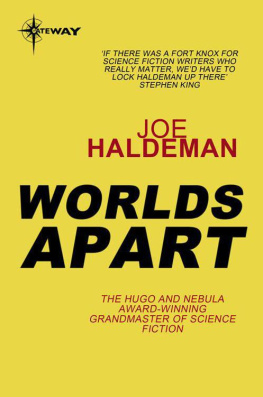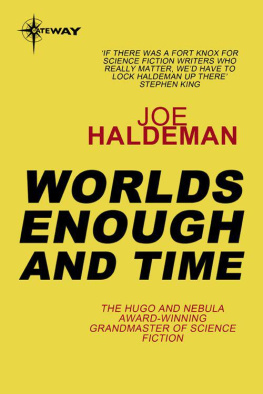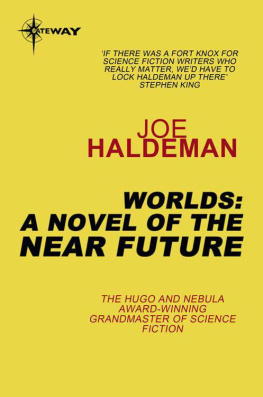A V isit to H aldeman and Other S tates of M ind
One
I N the spring of 1975 just before I left my place in Greenwich Village for a journey to Beverly Hills, I had a lunch date with Richard Cape at one oclock on the Upper East Side at Nicolas. Richard was one of the people I liked to be around just then to shore up my cynicism in case I felt myself slipping. It was a brilliant, crisp, newly scrubbed day, and Richard was broke and resplendent, not having had taxi fare, having walked from the Fifth Avenue apartment where he had been visiting for the past few months; he was dressed in an impeccably tailored blue blazer, Oxford cloth shirt open at the neck, a silk neckerchief with minuscule, abstract red and white flowers on a blue ground, soft gray flannel slacks, argyle socks, and a pair of soft brown leather loafers that fit like gloves, evidently custom-made. His hair had been newly dyed, jet black with flecks of gray at the temples, and he looked like a million dollars before taxes.
Richard moves in the worlds of politics and finance, of embezzlement, larceny, and war, with uncommon ease, and he is a man of profound principles. I once told him that one of his business ideas was indecent, and he responded, Listen, Charleseveryone but Richard calls me ChuckListen, Charles, it is uncalled for and untoward to charge me with indecency. I have known decency and indecency in my time. I have known virtue and villainy. I have walked in the valleys and on the hillsides of decency. I have walked in the sunshine and in the shadows of decency. (Here he chokes up.) I have walked on the coastlines of decency and waded in the chill rivulets of decency. I have descended into the hoary pits of decency, and I have climbed the lofty, swooning stupas of decency. I have walked the long, clean corridors of decency and here he weeps and cries outand I have had decency by the short hairs! Do you hear me, Charles? By the short hairs in my time! Do you know what I mean? Hunh? Dyunnerstan? By the short hairs! Dont talk to me about decency.
Nothing embarrasses Richard. Nothing offends him. Nothing seems inconceivable to him. Nothing strikes him as either too wonderful to be true or too horrible to be a proposition worth entertaining. Nothing frightens him.
Richard was born fifty-odd years ago in Chicago. He has spent his life, for the most part, dodging in and out of politics, working a time for Adlai Stevenson in the Presidential campaigns of 1952 and 1956 and then, when John Kennedy ran for President, raising money and doing political polling for the Kennedy organization. He put all of his polling material on computer tapes, and, whacking around with random inputs and dazzling outputs and abstruse analyses by professors of political science, he claimed to have predicted John Kennedys victory in 1960 within one tenth of 1 percentage point three months before the election occurred. He parlayed this stunning prediction into a corporate think tank. He put his corporation at the service of the State Department and the Defense Departmentand the Defense Department apparently put him to work in Vietnam.
I first met him when his company had something to do with the planning of the pacification program in Vietnam, and I endeared myself to him then by telling him that I thought the war was both unwinnable and morally reprehensible. I thought at the time that he must be up to his armpits in war crimes, and I have never learned since precisely what it was his company did in Vietnam. But I got to know him as a man who moves among politicians, political hacks and gofers, spies and counterspies, Pentagon generals and political rip-off artists.
In the course of a conversation we once had about going into business together, after his think tank went bankrupt following the Tet offensive in Vietnam, he introduced me to a fellow named Teddy who told me of a business he, Teddy, had once started in Rome. He realized that Americans have an inordinate fear of getting diarrhea while theyre traveling abroad in Europe, and that they attribute this diarrhea not to the vast numbers of gallons of wine that they choke down in their European spree but to the water that they drink. It occurred to Teddy that he could make a fortune by selling American bottled water to American tourists. He raised five thousand dollars for his business scheme, and he went out with the five thousand dollars and bought as many old bottles as he could and went to a printing shop and got a printer to make some labels shaped like huge golden American eagles, on which was printed the legend: American Bottled Water. Having spent his five thousand dollars, he then took his bottles down to a Roman fountain, filled the bottles with water, stuck his labels on them, and sold the stuff as American bottled water to American tourists. This is the kind of businessman Richard Cape knew, and so I thought it was important for me to stay in touch with him.
I suppose that Richard, with his support of the Vietnam War and other murky diversions, did as much as anyone to lay waste to the American Republic, andthough I kept this knowledge from myself for most of the years I knew himit was doubtless for that reason that I liked hanging around with him. He was my rotten self, and I sinned through him vicariously, skirting and sometimes plunging into disaster. He seemed always, by dint of his corruption, to have some special knowledge or strength that would redeem hima knowledge that, if it was not mysteriously special, might simply be the knowledge of the eternal weakness of human nature, and the names of his fellow humans who had shared in his weakness and were thus bound to him.
Once in Puerto Rico, the only time Ive been there, Richard and his friend Simonetta, and my wife, Suzi, and I stayed in the condominium of one of Richards political acquaintances. (To whom do I owe a favor nowthe Milk Fund, an oil company, the CIA?) We spent the days on the beaches talking good, decent, generous liberal politics, and swimming, and having lunch and drinking, and we spent the evenings in casinos. One evening, after a longish day in which Richard and I had drunk a good deal while discussing whether draft dodgers and war protesters should be exiled to Eugene McCarthys hometown in Minnesota, we fetched up at one of the more stylish casinos, and, as the bouncer at the door noticed, Richard had neglected to wear socks. House rule: no sockless patrons in the casino. Perhaps they did not know who Richard was? It did not matter; the house rule was inflexible. How could the house rule be inflexible? Did this fellowwhat was his name and position incidentally?did this fellow not unnerstan that some rules were meant to be bent when certain ah people presented themselves at the door? Where was the manager? Busy. Ah-ha. In that case (Richard turned to Simonetta), would Simonetta step into the ladies room for a moment?
Richard and Simonetta (Once, when she was gone for a long time in San Juan with Suzi, and I was worried, Richard said: Ah, fuck, you dont have to worry about her; shes CIA, ya know. Shed kill anyone gave her trouble; ya know what I mean? She doesnt give a shit, shed as soon kill someone as anything; as a matter of fact, I think shed like to kill someone in San Juan; shes a mean son of a bitch) stepped off to the side of the lobby, and Richard whispered to the lovely, gentle Simonetta, who loved Richard and would do anything he said, and then she disappeared into the ladies room, emerged a few minutes later, handed something to Richard, who disappeared into the mens room and then reappeared at the door to the casinowearing Simonettas pantyhose for socks.


